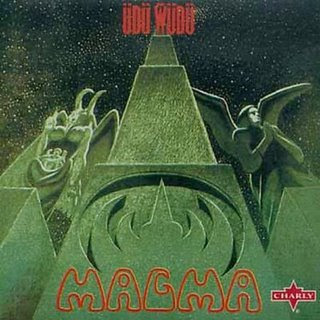Magma is the crazier one. Further out on the prog end of the rock spectrum, almost into avant-garde composition. Seems like if you dig it, there's plenty to dig deep into - with historical live jams.
Maybe these quotes will help you decide if you're down with Magma.
Kobaïan is a lyrical language created by French drummer and composer Christian Vander for his progressive rock band Magma. It is the language of Kobaïa, a fictional planet invented by Vander and the setting for a musical "space opera" sung in Kobaïan by Magma on ten concept albums.
French drummer and composer Christian Vander formed progressive rock band Magma in late 1969 in an attempt to fill the void left by the death of American jazz musician and composer John Coltrane.
Zeuhl means celestial in Kobaïan. Zeuhl typically blends progressive rock, symphonic rock, fusion, neoclassicism, aspects of rock in opposition and vocal elements of African-American spirituals and Western military call and response. Common aspects include dissonance, marching themes, throbbing bass, keyboards including piano, Rhodes piano, or organ, and brass instruments.
As one might expect, the music from Kobaia several hundred years from now is very unlike what we are accustomed to on twentieth century planet earth. Magma's music is very strange, beautiful, and ultimately rewarding, but it does require an open mind on the part of the listener. It is music that must be experienced fully with body, heart and soul: not simpley a cerebral performance of some kind of space opera by clever musicians, but a full blown spiritual experience with the music acting as the connecting vehicle between performer and listener.
That's right: zombies.

Gong is more traditionally psychedelic and proggy, being sung in English but making not necessarily more sense. The 3-album tale of Zero the Hero, an intergalactic plan to raise human consciousness via the Angel's Egg, initiated over the Radio Gnome Invisible wavelengths, from a command center in the Hymnalayas of Tibet. 'Tis a bit silly, but often groovy live.
Here's the resource background for your Gong preview reading.
The Gong mythology is a collection of recurring characters, themes and ideas that permeate the rock albums of Gong. The story begins when a pig-farming egyptologist called Mista T Being is sold a "magick ear ring" by an "antique teapot street vendor & tea label collector" called Fred the Fish. The ear ring is capable of receiving messages from the Planet Gong via a pirate radio station called Radio Gnome Invisible.
Meanwhile, the mythology's central character, Zero the Hero, is going about his everyday life when he suddenly is compelled to seek after heroes and starts worshipping the Cock Pot Pixie, one of a number of Pot Head Pixies from the Planet Gong. These pixies are green with propellers on their heads, and they fly around in tea-pots.
Zero's (drug-induced) trip to the Planet Gong continues, and the Pot Head Pixies explain to him how their flying teapots fly (a system known as Glidding). He is then taken to the One Invisible Temple of Gong.
Inside the temple, Zero is shown the Angel's Egg — the physical embodiment of the 32 Octave Doctors (descendants of the Great God Cell). The Angel's Egg is a magic-eye mandala, also a sort of recycling plant for Pot Head Pixies.
A grand plan is revealed to Zero...
Wha?


No comments:
Post a Comment